
Children categories
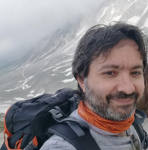 His main activities are focused in the study of the optical properties of the atmosphere, the interactions between ultraviolet radiation, visible and infrared with atmospheric constituents; his research interests have turned to the impact that aerosols, trace gases and clouds exert on the radiation balance of the Earth-atmosphere system, focusing in particular on the assessment of the direct radiative effects produced by the aerosol, on the assessment of the radiation balance in the polar areas and the role that gas trace, aerosols and clouds in these regions have particularly sensitive.
His main activities are focused in the study of the optical properties of the atmosphere, the interactions between ultraviolet radiation, visible and infrared with atmospheric constituents; his research interests have turned to the impact that aerosols, trace gases and clouds exert on the radiation balance of the Earth-atmosphere system, focusing in particular on the assessment of the direct radiative effects produced by the aerosol, on the assessment of the radiation balance in the polar areas and the role that gas trace, aerosols and clouds in these regions have particularly sensitive.
The scientific activity has been divided among the experimental research (mainly solar photometry, measurements of downwelling and upwelling radiative fluxes in the visible and near-and far-infrared, aerosol optical and physical properties), and modelling using radiative transport codes for the evaluation of the radiative fluxes in the atmosphere. Over the past years he has participated at multiple Antarctic polar campaigns, gaining experience in instrumentation and data analysis. He is co-author of more than 50 articles in international journals.
Scopus - Author ID: 7005284903 ![]() http://orcid.org/0000-0002-5009-9876
http://orcid.org/0000-0002-5009-9876
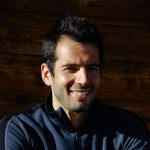 He received his master degree in nuclear and particle physics from Milano-Bicocca University in 2014. His background ranges from applied particle physics to environmental radioactivity and high-energy physics. His work at the nuclear fission reactor in Pavia (Italy) introduced him to the ice core science field. He did his PhD (2014-2017) at the Niels Bohr Institute (Copenhagen, Denmark), working on ice core continuous flow analysis systems and past sea ice reconstructions. He continued his research on climate reconstructions at the Niels Bohr Institute, at the Italian National Research Council and at the University of Venice in 2018 and 2019. Between 2020 and 2022 he was Marie Curie fellow at the University of Venice with a project on computer vision and Artificial Intelligence techniques applied to ice core analyses. Since September 2022 he works on glacier modeling via deep neural networks in collaboration with the University of California, Irvine. He is particularly interested in exploring AI and Machine Learning approaches to Earth System Science problems.
He received his master degree in nuclear and particle physics from Milano-Bicocca University in 2014. His background ranges from applied particle physics to environmental radioactivity and high-energy physics. His work at the nuclear fission reactor in Pavia (Italy) introduced him to the ice core science field. He did his PhD (2014-2017) at the Niels Bohr Institute (Copenhagen, Denmark), working on ice core continuous flow analysis systems and past sea ice reconstructions. He continued his research on climate reconstructions at the Niels Bohr Institute, at the Italian National Research Council and at the University of Venice in 2018 and 2019. Between 2020 and 2022 he was Marie Curie fellow at the University of Venice with a project on computer vision and Artificial Intelligence techniques applied to ice core analyses. Since September 2022 he works on glacier modeling via deep neural networks in collaboration with the University of California, Irvine. He is particularly interested in exploring AI and Machine Learning approaches to Earth System Science problems.
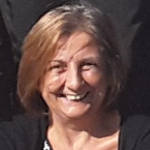 She is currently CTER - IV level at the Institute of Polar Sciences in Messina.
She is currently CTER - IV level at the Institute of Polar Sciences in Messina.
She has participated to numerous oceanographic cruises in the Mediterranean Sea with particular regard to the collection, treatment and analysis of samples. She actively participates at national and international research projects on polar issues.
Her research activities are mainly devoted to the study of the ecology of bacterial populations in aquatic samples (seawater and brines) and permafrost. In particular: to the study of the biomass of prokaryotes by counting and morphometric and morphological analyses, through the application of microscopic techniques in epifluoresence and image analysis; the estimation of physiological profiles at community level of prokaryotes through BIOLOG Ecoplate; the quantification of viable cells through the use of biomarkers (LIVE/DEAD and CTC). She also performs graphic and statistical processing of experimental data and collaborates in the drafting of scientific papers.
Scopus - Author ID: 7801432695
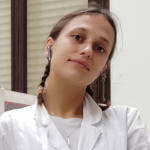 Graduated in Experimental and Applied Biology, Environmental Biology and Biodiversity curriculum at the University of Pavia with the thesis Biodegradation of polyethylene (PET ) and polylactic acid (PLA) using Fusarium sp. and evaluation of enzymatic activity. During the bachelor degree, she carried out a short period of study and research at the Marine Research and High Education (MaRHE) center, on the island of Magoodhoo, in the Maldivian Archipelago, where she focused on marine ecology and safeguard of biological systems, related to the coral reef. During the master degree, she took part in the monitoring of alien species project, in the Marine Protection Area of the Porto Venere Regional Park at ENEA, implementing the previous knowledge and techniques of sampling, treatment, and analysis of marine samples. Thanks to internships in microbiology and mycology, experienced during bachelor and master career respectively, she was able to learn techniques of microbiological analysis associated with recalcitrant materials, deepening associated with plastics. Currently, she caries out research activities for the identification and characterization of antibiotic resistant and virulent environmental vectors in coastal marine areas and deep environments at the Institute of Polar Sciences (CNR-ISP) of Messina.
Graduated in Experimental and Applied Biology, Environmental Biology and Biodiversity curriculum at the University of Pavia with the thesis Biodegradation of polyethylene (PET ) and polylactic acid (PLA) using Fusarium sp. and evaluation of enzymatic activity. During the bachelor degree, she carried out a short period of study and research at the Marine Research and High Education (MaRHE) center, on the island of Magoodhoo, in the Maldivian Archipelago, where she focused on marine ecology and safeguard of biological systems, related to the coral reef. During the master degree, she took part in the monitoring of alien species project, in the Marine Protection Area of the Porto Venere Regional Park at ENEA, implementing the previous knowledge and techniques of sampling, treatment, and analysis of marine samples. Thanks to internships in microbiology and mycology, experienced during bachelor and master career respectively, she was able to learn techniques of microbiological analysis associated with recalcitrant materials, deepening associated with plastics. Currently, she caries out research activities for the identification and characterization of antibiotic resistant and virulent environmental vectors in coastal marine areas and deep environments at the Institute of Polar Sciences (CNR-ISP) of Messina.
 Graduated in Communication Strategies at the University of Padua, during her studies she could experimented different formats of scientific communication, being part of the Planet Book photobook project (Contrasto editor) and participating several times at the public presentations of the book. She wrote as a volunteer for the CICAP online magazine, Query, deepening the theme of the relations between science, pseudoscience and society.
Graduated in Communication Strategies at the University of Padua, during her studies she could experimented different formats of scientific communication, being part of the Planet Book photobook project (Contrasto editor) and participating several times at the public presentations of the book. She wrote as a volunteer for the CICAP online magazine, Query, deepening the theme of the relations between science, pseudoscience and society.
She graduated at the Master’s in Science Communication “Franco Prattico” at SISSA (Scuola Internazionale di Studi Superiori Avanzati) in Trieste. During the Master experience, she had the opportunity to test her skills trying different medium and formats for scientific communication and to learn the theorical basis. During her traineeship, she carried out support activities for the institutional communication of the Institute of Polar Sciences of CNR, managing and creating the contents and the strategy for the social media channels.
Currently, she is handling the presence of the Beyond EPICA – Oldest Ice Core project on social media and she is also involved on outreach and disseminations activities related to the project. She is also taking care of the development of Beyond EPICA communications strategy with partners and the relations with them.
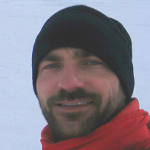 He mainly deals with two research topics: the physical and optical characterization of atmospheric particulate matter, also known as aerosol, and the estimate of the energy balance at the surface. As for the first topic, he uses techniques such as solar and lunar photometry for the estimation of the optical thickness of the aerosols in the atmosphere, the in-situ measurement of the scattering and absorption coefficients and the size distribution, through online optical. This last type of measurement is also carried out on profiles obtained by means of a tethered balloon. As for the energy balance, he uses an integrated approach between measurements and calculation codes for the radiative part, while the heat and mass balances are estimated by direct eddy covariance measurements. These activities take place mainly at the CNR infrastructures in Ny-Ålesund (Svalbard) and at the Korean base Jang Bogo in Antarctica, a country in which a close collaboration has been active for years.
He mainly deals with two research topics: the physical and optical characterization of atmospheric particulate matter, also known as aerosol, and the estimate of the energy balance at the surface. As for the first topic, he uses techniques such as solar and lunar photometry for the estimation of the optical thickness of the aerosols in the atmosphere, the in-situ measurement of the scattering and absorption coefficients and the size distribution, through online optical. This last type of measurement is also carried out on profiles obtained by means of a tethered balloon. As for the energy balance, he uses an integrated approach between measurements and calculation codes for the radiative part, while the heat and mass balances are estimated by direct eddy covariance measurements. These activities take place mainly at the CNR infrastructures in Ny-Ålesund (Svalbard) and at the Korean base Jang Bogo in Antarctica, a country in which a close collaboration has been active for years.
He is author of about 100 publications including journal articles and contributions in scientific books.
Scopus - Author ID: 24367405100
![]() http://orcid.org/0000-0002-8394-2292
Google Scholar
http://orcid.org/0000-0002-8394-2292
Google Scholar
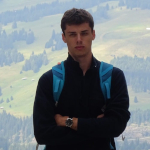 Graduated in Environmental Science and Technology from the University of Bicocca in 2023. The thesis focused on characterizing the carbonaceous and mineral content of Light Absorbing Particles deposited on the snow surface of the Shallap Glacier (Peru), including a modeling study based on back-trajectory analysis. Currently a Ph.D. student in Polar Sciences at Ca' Foscari University since December 2023, in collaboration with the Institute of Polar Sciences in Milan and Venice. The research aims to study the impact of biomass burning emissions and dust uplift on the Arctic atmosphere by analyzing the composition and the optical and microphysical properties of aerosols, integrating this information with the study of their source areas.
Graduated in Environmental Science and Technology from the University of Bicocca in 2023. The thesis focused on characterizing the carbonaceous and mineral content of Light Absorbing Particles deposited on the snow surface of the Shallap Glacier (Peru), including a modeling study based on back-trajectory analysis. Currently a Ph.D. student in Polar Sciences at Ca' Foscari University since December 2023, in collaboration with the Institute of Polar Sciences in Milan and Venice. The research aims to study the impact of biomass burning emissions and dust uplift on the Arctic atmosphere by analyzing the composition and the optical and microphysical properties of aerosols, integrating this information with the study of their source areas.
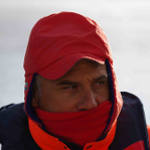 Degree in Geological Sciences in 1987 in Bologna. Researcher at the CNR Institute of Marine Sciences from 1994 to 2019, he has been involved in biogeochemical and sedimentological research in the marine and coastal environment.
Degree in Geological Sciences in 1987 in Bologna. Researcher at the CNR Institute of Marine Sciences from 1994 to 2019, he has been involved in biogeochemical and sedimentological research in the marine and coastal environment.
Sedimentology, biogeochemistry and dynamics of marine sediments and particles. Main focus on flux and mass balance calculations for carbon, as well as biogenic and terrigenous constituents to understand origins, transport pathways and fates of particles on continental margins. Study of organic matter in the sediment and of nutrient fluxes at the water-sediment interface. His research interests currently are: (a) vertical fluxes of particles and lateral transportation of materials from the continental shelf to deep basins in Arctic and Mediterranean Sea; (b) Non-destructive core logging/scanning methods including XRF Core Scanning.
Participation at EC and Arctic projects (Snow, Arca, Defrost). PI or WP leader of projects funded by ONR and national projects. Participation in more than 75 oceanographic cruises between 1990 and 2019 (on which 20 as Chief Scientist) for a total of 525 days of shipboard experience.
Author and co-author on over 158 publications (+ 120 abstracts) included data and technical reports, of which 62 publications on Scopus, 1513 citations, H index = 23.
Scopus - Author ID: 6602827994 Google Scholar
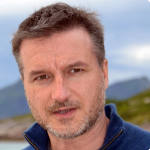 Director of Research at CNR-ISP.
Director of Research at CNR-ISP.
Laurea (M. Sc. equiv.) in Geology (1999), University of Padova. PhD (European Doctorate Label) in Earth Sciences (2005), University of Padova, in collaboration with the Australian National University.
His research mainly focuses on the development and application of geochemical proxies for paleoclimate reconstructions on a variety of timescale and aims to address some of the fundamental aspects of the biomineralization mechanisms in calcifying organisms (corals, molluscs, calcareous algae). This includes the analysis of minor and trace elements, as well as stable (11B/10B) and radiogenic (143Nd/144Nd, 87Sr/86Sr, 230Th/U) isotopes in biogenic carbonates.
He has acquired significant expertise in the geochemistry of biogenic carbonates, physical and chemical oceanography and deep-sea habitat mapping while working for extended periods at world leading institutions for geochemistry and paleoclimate related studies (Australian Institute of Marine Sciences, Australian National University, Lamont-Doherty Earth Observatory, Laboratoire des Sciences du Climat et de l'Environnement, Université Paris-Saclay and University of Western Australia). He has participated to 20 oceanographic cruises in the Mediterranean Sea, Atlantic, Indian Ocean, and the Ross Sea off Antarctica (some of them as chief or co-chief scientist), and several SCUBA diving expeditions in the Caribbean Sea, Red Sea, Indian and Pacific Ocean.
He has authored more than 90 peer-reviewed scientific papers, 4 book chapters, more than 120 abstracts and 20 invited talks, and he has served as a proposal reviewer for ERC Advanced Grant, NSF-USA, ANR-France, CNRS/INSU-France, NSERC-Canada, FONDECYT-Chile, DFG-Germany, ISF-Israel, Czech Science Foundation, EUROFLEET Plus, Swiss National Science Foundation Eccellenza Professional Fellowship, SCOR WG and Italian Programme for recruitment of young researcher as well as for 25 peer-reviewed scientific journals.
![]() http://orcid.org/0000-0001-5598-2214 Google Scholar
http://orcid.org/0000-0001-5598-2214 Google Scholar
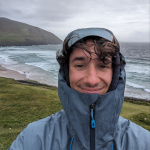 I am a Ph.D. candidate at the University of Milano-Bicocca in Milan, Italy.
I am a Ph.D. candidate at the University of Milano-Bicocca in Milan, Italy.
My background includes a bachelor's degree in Physics and Astrophysics from the University of Florence, followed by a master's degree in Physics of the Earth System at the University of Bologna.
My research focuses on snow and ice multispectral remote sensing, where I investigate the physical properties of the snowpack and the radiative effects that dust and algae have on it. Beyond my primary research, I am interested in drones, instrumentation, and atmospheric dynamics.
More...
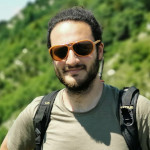 Research associate at CNR-ISP, Bologna.
Research associate at CNR-ISP, Bologna.
B.Sc. in Geology (2014) at the University of Bologna, M.Sc. degree (2016) in Earth Sciences at the Swiss Federal Institute of Technology (ETH Zurich), Switzerland and PhD (2021) in geochemistry at ETH Zurich and the Max Planck Institute for Chemistry, Mainz, Germany.
His research is centred around the study of biogeochemical cycling of nutrients in the modern marine environment, and their reconstruction in the geological past. His study addresses some fundamentals aspects of the nitrogen cycle and its interconnections with the trophic structure of marine food webs and ocean oxygenation. In particular, he works on the development and application of geochemical methods aimed at analysis and interpretation of the nitrogen isotope composition (15N/14N) of organic matter trapped within the biomineral crystalline matrix of fossils and modern organisms, as well as on organic matter from phytoplankton and zooplankton and seawater nitrate.
He has been studying and working in research institutes abroad for a total of 8 years and he is currently associated as a postdoctoral researcher at the Max Planck Institute for Chemistry. He is involved in 8 publications on international journals, 2 chapters books of the International Ocean Drilling Program (IODP) and 17 abstracts. He obtained a scholarship award from the Swiss Federal Institute of Technology, and research funding from the International Long Term Ecological Research (ILTER) network and the Max Planck Society. He participated in IODP expedition 383 to the Antarctic Ocean aboard R/V JOIDES Resolution.
![]() https://orcid.org/0000-0002-6772-7269
https://orcid.org/0000-0002-6772-7269
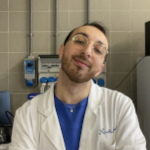 Bachelor Degree in Environmental and Natural Sciences (University of Udine) and Master's Degree in Marine Biology (University of Bologna). Current position: research grant at the Institute of Polar Sciences (CNR-ISP) in Bologna. I'm studying microplastics and POP pollution in the continuum snow-ocean of the Arctic domain in the European Project Horizon-CL6-2023 INNOVATIVE COMMUNITY ENGAGEMENT FOR BUILDING EFFECTIVE RESILIENCE AND ARCTIC OCEAN POLLUTION-CONTROL GOVERNANCE IN THE CONTEXT OF CLIMATE CHANGE (ICEBERG).
Bachelor Degree in Environmental and Natural Sciences (University of Udine) and Master's Degree in Marine Biology (University of Bologna). Current position: research grant at the Institute of Polar Sciences (CNR-ISP) in Bologna. I'm studying microplastics and POP pollution in the continuum snow-ocean of the Arctic domain in the European Project Horizon-CL6-2023 INNOVATIVE COMMUNITY ENGAGEMENT FOR BUILDING EFFECTIVE RESILIENCE AND ARCTIC OCEAN POLLUTION-CONTROL GOVERNANCE IN THE CONTEXT OF CLIMATE CHANGE (ICEBERG).
 B. Sc. in Geological Sciences (University of Bologna, 2015) and M. Sc. in Geology and Land Management (University of Bologna, 2018).
B. Sc. in Geological Sciences (University of Bologna, 2015) and M. Sc. in Geology and Land Management (University of Bologna, 2018).
He starts his research activity in 2018 at ISMAR-CNR in Bologna with an internship and then a fellowship, working on geochemical and biogeochemical analyses on marine sediment cores from the Adriatic Sea.
Currently employed as CTER at ISP-CNR in Bologna, he deals with biogeochemical analyses and the management of the organic geochemistry laboratory.
In September 2019 he started a PhD project in Polar Sciences at Ca’ Foscari University of Venice. His project focuses on biogeochemical and sedimentological analyses of marine sediment cores from the Arctic and Subarctic region, to study the environmental variability, the carbon cycle and the glacial-interglacial cycles during the Late Quaternary.
![]() http://orcid.org/0000-0002-8034-6049
http://orcid.org/0000-0002-8034-6049
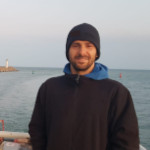 Dr. Francesco Paladini de Mendoza's research focuses mainly on the dynamic processes at the water-sediment interface triggered by littoral and deep bottom currents. Over time, he has gained much experience in field measurements and management of instruments and platforms for monitoring the chemical and physical properties of the marine environment. He actively participates in the management of some observational network infrastructures (EMSO-ERIC and SiOS). He has published 21 scientific papers emphasizing measurement and multidisciplinary approach in the study of the marine environment. He has participated in oceanographic and geological-marine expeditions in the Mediterranean Sea and Oceans, accumulating more than 400 operational days at sea.
Dr. Francesco Paladini de Mendoza's research focuses mainly on the dynamic processes at the water-sediment interface triggered by littoral and deep bottom currents. Over time, he has gained much experience in field measurements and management of instruments and platforms for monitoring the chemical and physical properties of the marine environment. He actively participates in the management of some observational network infrastructures (EMSO-ERIC and SiOS). He has published 21 scientific papers emphasizing measurement and multidisciplinary approach in the study of the marine environment. He has participated in oceanographic and geological-marine expeditions in the Mediterranean Sea and Oceans, accumulating more than 400 operational days at sea.
![]() http://orcid.org/0000-0002-9495-3878
http://orcid.org/0000-0002-9495-3878
 Ministero dell'Universita e Ricerca
Ministero dell'Universita e Ricerca
Programma Ricerche Artico
Programma Nazionale di Ricerca in Antartide
 Ministero degli Affari Esteri e della Cooperazione Internazionale
Ministero degli Affari Esteri e della Cooperazione Internazionale
L'Italia e l’Artico
L’Italia e l’Antartide
CNR-ISP
National Research Council
Institute of Polar Sciences
c/o Scientific Campus - Ca' Foscari University Venice - Via Torino, 155 - 30172 VENEZIA MESTRE (VE)
Phone: +39 041 2348547 - E-mail: protocollo.isp AT pec.cnr.it
Fax: +39 041 2348 549 - Codice Fiscale: 80054330586 - P.I.:02118311006
Unless otherwise indicated, the content of this site is licensed : Attribution Non Commercial Share Alike 4.0 International (CC BY-NC-SA 4.0)
Privacy policy e Cookie policy - Transparent administration (CNR)








